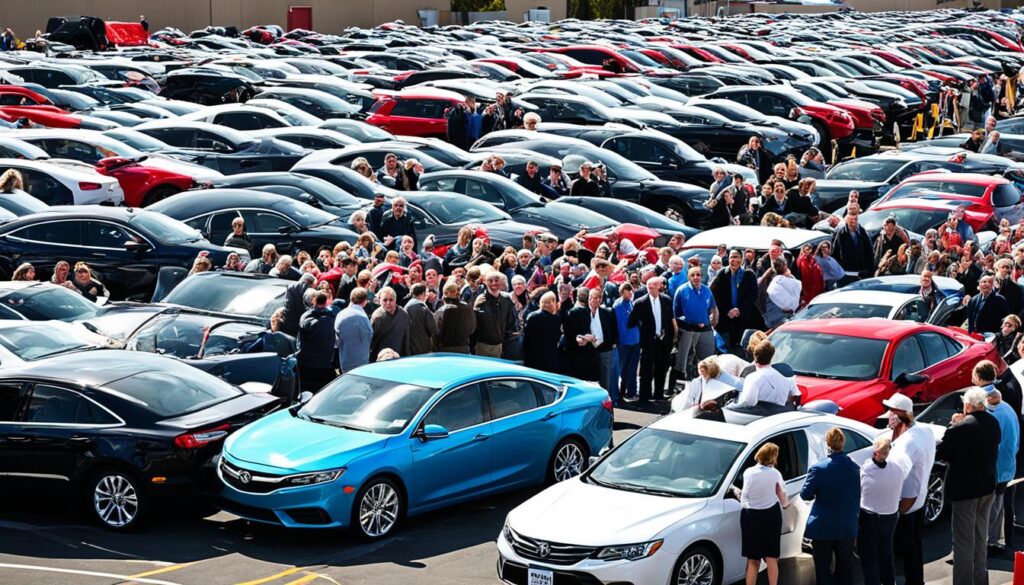What Does “No Reserve” Mean at a Car Auction
When attending a car auction, you may come across the term “no reserve” being used to describe certain vehicles. This phrase holds significant importance, as it directly impacts the bidding process and the eventual sale price of the cars. Understanding the concept of “no reserve” auctions is crucial for both buyers and sellers who wish to navigate these events successfully.
At a “no reserve” car auction, the seller has agreed not to set a minimum price that the vehicle must sell for. This means that the car will be sold to the highest bidder, regardless of the final bid amount. This approach differs from traditional auctions where a reserve price is set, and the car may not be sold if the bids do not meet the seller’s expectations.
The “no reserve” structure can be advantageous for both buyers and sellers. Buyers may have the opportunity to secure a great deal on a vehicle if the bidding remains low, while sellers can potentially achieve a higher selling price if there is significant interest in the car. However, it’s important to understand the risks and strategies involved in these types of auctions to make informed decisions and maximize the benefits.
Understanding the Concept of “No Reserve” at Car Auctions
When it comes to car auctions, the term “no reserve” holds significant importance. In a traditional car auction, the seller typically sets a minimum price, known as the reserve price, below which they are unwilling to sell the vehicle. However, in a “no reserve” auction, the seller chooses not to set a minimum price, allowing the highest bidder to acquire the car, regardless of the final bid amount.
The Significance of “No Reserve” Pricing
The lack of a reserve price in a “no reserve” auction can create a more dynamic and competitive bidding environment. Buyers know they have a genuine chance to acquire the vehicle at a potentially lower price, as the seller has foregone the safety net of a reserve price. This can lead to more aggressive bidding, as buyers strive to secure the best possible deal.
Benefits for Buyers and Sellers
- For buyers, a “no reserve” auction presents an opportunity to find exceptional deals on cars. Without a minimum price set by the seller, buyers may be able to secure a vehicle at a price lower than the market value.
- For sellers, a “no reserve” auction can be a strategic decision. It allows them to generate maximum interest and competition among bidders, potentially leading to a higher final sale price. However, this approach also carries the risk of the car selling for less than the seller’s original expectations.
Ultimately, the decision to hold a “no reserve” auction involves carefully weighing the potential risks and rewards for both buyers and sellers. Understanding the dynamics of this auction format can help participants make informed decisions and navigate the car auction landscape more effectively.

“In a ‘no reserve’ auction, the final sale price is determined solely by the highest bid, creating an exciting and unpredictable bidding experience for all involved.”
| Buyer Advantages of “No Reserve” Auctions | Seller Advantages of “No Reserve” Auctions |
|---|---|
| Opportunity to find great deals on cars | Generates maximum interest and competition among bidders |
| Bidding can be more competitive without a minimum price | Potential to achieve a higher final sale price |
| Chance to acquire a vehicle at a lower price than market value | Eliminates the risk of a car not selling due to a reserve price |
What to Expect at a “No Reserve” Car Auction
Attending a “no reserve” car auction can be an exhilarating and rewarding experience, but it requires careful preparation and strategic bidding. Before the auction, we recommend thoroughly researching the vehicles available and inspecting them closely to assess their condition and value. This will help us set a maximum bid that aligns with our budget and valuation.
On auction day, we should be prepared to bid aggressively, as the lack of a reserve price can create a fast-paced and competitive environment. It’s important to stay disciplined and not get caught up in the excitement, as it’s easy to overspend at a “no reserve” auction. By understanding the dynamics and risks involved, we can increase our chances of securing a great deal on a vehicle.
Additionally, we should consider employing car auction bidding tips, such as starting our bids at a lower price and gradually increasing them, or using proxy bidding to avoid getting caught in a bidding war. By following these strategies and conducting thorough pre-auction research, we can navigate the “no reserve” auction process with confidence and maximize our chances of success.

